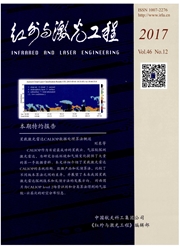

 中文摘要:
中文摘要:
在相干探测系统中,信号光与本振光在探测器上进行混频产生中频信号,实现将携带目标信息的信号光转置与放大,实现了近量子噪声限的探测方式。为了有效利用回波信号获得良好的探测性能,有必要对两束光的混频特性进行研究。信号光与本振光在探测器光敏面上的分布决定了两束光的混频效率,只有信号光与本振光的场分布完全一致探测器输出的中频光电流最大。通过对高斯光束的混频进行理论推导并进行数值模拟,结果表明混频效率对光敏面上信号光的分布较为敏感,本振光束腰半径应该等于或略大于信号光束腰的半径,探测器光敏面半径应约为本振光束腰半径的2倍。
 英文摘要:
英文摘要:
A detectable intermediate frequency current signal is generated by mixing the signal beam with the local oscillator beam in a coherent detection system. The signal beam which carries the target information is amplified and frequency shifted to allow operation at a sensitivity that approaches the shotnoise limit. To make full use of the return signal and achieve preferable performance,the mixing characteristics should be considered. Signal and local oscillator beam incident on the surface of photo-detector, and the influence of fields distribution on mixing efficiency was discussed in this paper. The highest intermediate frequency current could only be achieved when the field distribution of the signal beam was completely identical with that of the local oscillator beam. For both the signal and local oscillator were Gaussian beam coherent in different conditions, such as focus offset, beam waist differecnce and beam waist mismatch, the mixing efficiency was theoretically analyzed and numerically.Numerical simulation shows that the mixing efficiency is more sensitive to the alignment of the incident signal beam than that of the local oscillator beam, the radius of the local oscillator beam waist should be equal or slightly larger than that of the signal beam, the detector radius should be double that of the local oscillator beam waist.
 同期刊论文项目
同期刊论文项目
 同项目期刊论文
同项目期刊论文
 期刊信息
期刊信息
